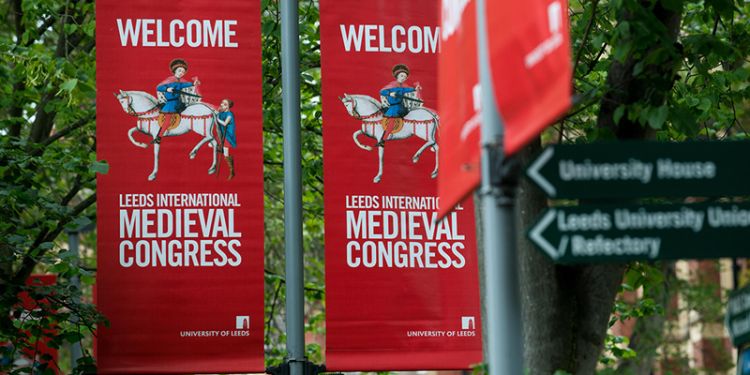An interview with Tim Watkinson: Reflections on Medieval Studies and the International Medieval Congress

Leeds’ Director of Communications and Engagement shares his journey from MA student to university leadership.
Tim Watkinson, now Director of Communications & Engagement at the University of Leeds, began his journey here as a postgraduate student with the IMS, studying MA Medieval Studies (1993-4). Watkinson looked back on his time in the programme, as well as sharing memories of the first-ever International Medieval Congress, reflecting on how his studies helped to shape a career in communications.

What do you remember most about your time as an MA student at Leeds?
I recall being very excited by the opportunity to stay at Leeds after my undergraduate studies, attracted by the flexibility of the MA programme and the breadth of study across the modules. It enabled me to study widely across almost a millennium of historical, literary, and political themes, from mystery plays to monastic cultures, Arthurian legends, and the 14th-century crisis.
I was encouraged by supportive tutors such as Lesley Johnson and Peter Meredith who inspired me to explore my fields through their own passion and opened new ways of considering different perspectives. Of course, there were late, long hours of research in the Brotherton Library, but also an active social scene with fellow students from the UK, Iceland, Greece, and the USA, providing a lovely international perspective. Our common room was in the former church, now the drama studios; it was drafty but we made it home.
On a quirkier note, I self-funded my MA through part-time work at the snack bars at Leeds train station, so I also have memories of revising vulgate Latin while serving hot drinks to passengers on their morning commute.
Are there any transferable skills from your MA that you've found to be the most useful within your career in communications?
I remember that the then Director, Dr Simon Forde, emphasised the vocational aspects of the programme for progressing a career in academia – we were taught research methods, bibliography, languages, and how to parse Latin scripts.
While my career went in a different direction, an MA degree opened doors for me that might otherwise have been shut – and I hope that’s still the case for students today.
The skills I developed through the MA have helped me across my career – the discipline of self-guided learning, the curiosity to consider different perspectives, and the importance of meeting deadlines! With a communications career mostly in Parliament and universities – both tracing roots to the medieval period – it’s been handy to have a sense of their history.
What are your memories regarding the early years of the International Medieval Congress? Why do you think that the congress has continued to grow so successfully over the years?
I was fortunate to be employed as one of the helpers at the very first IMC at Bodington Hall in the summer of 1994, getting to know Axel Müller and working alongside my friends David Packer and Steph Dickenson. David is now Head of Collection Care at the British Museum, and Axel is IMC Director – so at least two of us stayed in the field!
This was my first significant academic conference, so do I remember being slightly awed by such a large gathering of true experts, but impressed by the range of seminars, symposiums, and entertainment on offer. My duties were basically ‘gophering,’ with a lot of minibus runs to transport delegates between venues and the city centre, and redirecting lost souls to their desired events on the site.
IMC 2023 was one of the first things I witnessed on my return to Leeds as a member of staff, and I was blown away by its progression over the years. The sheer range of topics it covers, and expertise it attracts from Europe, the Americas, and further afield. It takes over the central campus in such a visible way, with events, displays, and demonstrations giving a real festival feel; a celebration of all things medieval.
We still offer an MA in Medieval Studies here at Leeds. If you are interested in applying, full details can be found here or contact historypgt@leeds.ac.uk. More information about the Institute for Medieval Studies at Leeds can be found here.




